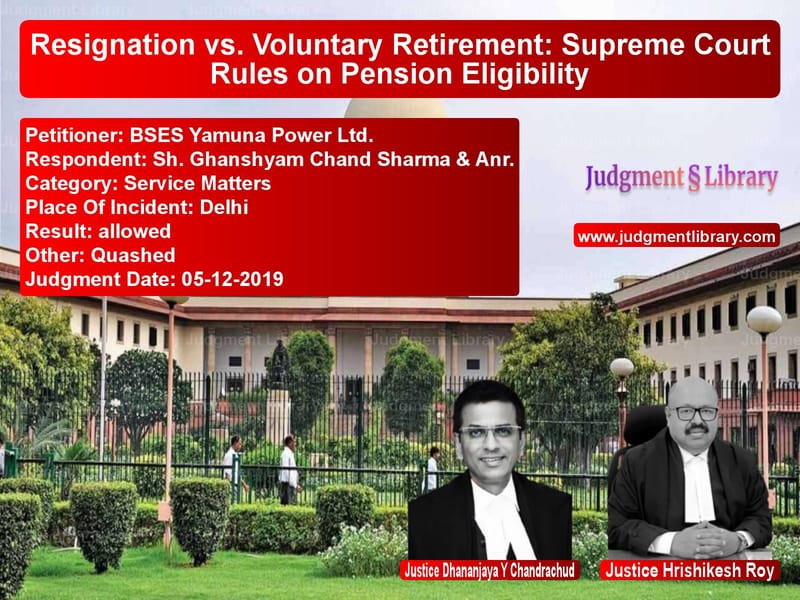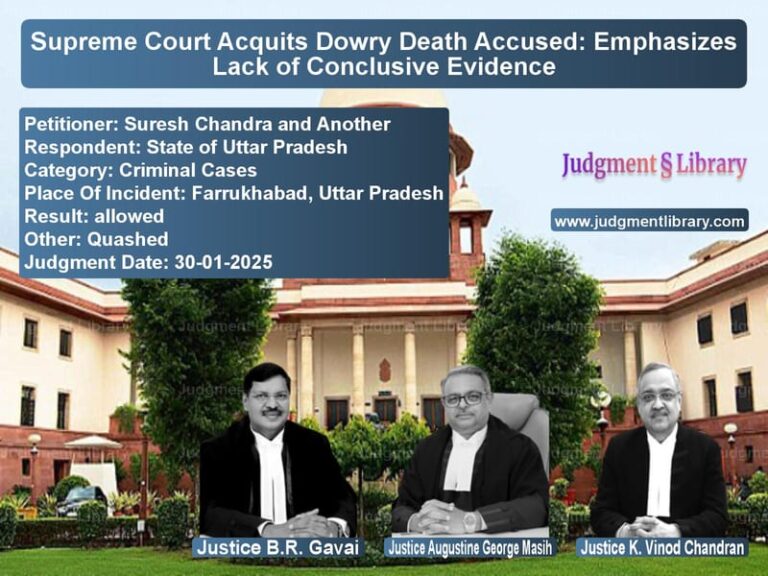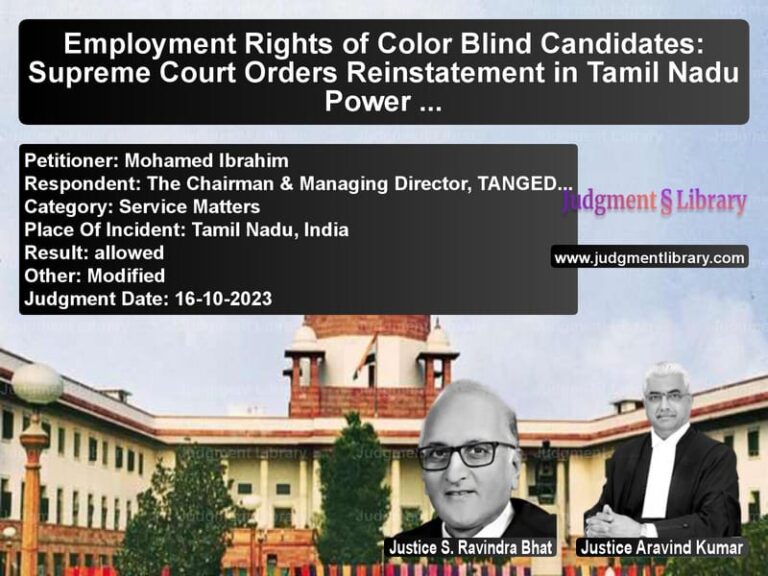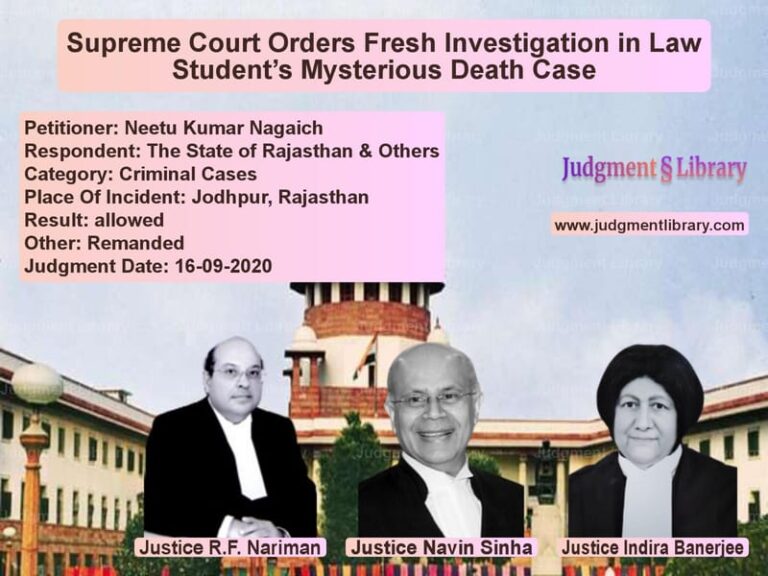Resignation vs. Voluntary Retirement: Supreme Court Rules on Pension Eligibility
The case of BSES Yamuna Power Ltd. v. Sh. Ghanshyam Chand Sharma & Anr. is a landmark judgment regarding the interpretation of resignation and voluntary retirement in the context of pension eligibility. The Supreme Court, in its judgment dated December 5, 2019, ruled that an employee who resigns from service forfeits their past service and is not entitled to pension benefits. The Court overturned the Delhi High Court’s decision, which had granted pensionary benefits to the respondent.
Background of the Case
The case revolves around Ghanshyam Chand Sharma, who was employed as a daily-rated mazdoor on July 9, 1968. His services were regularized on December 22, 1971, when he was appointed as a Peon. On July 7, 1990, Sharma tendered his resignation, which was accepted by the employer with effect from July 10, 1990.
Upon reaching retirement age, Sharma sought pensionary benefits. However, his request was denied on two grounds:
- He had not completed 20 years of service to qualify for pension.
- Since he had resigned, his past service stood forfeited, making him ineligible for pension under Rule 26 of the Central Civil Service (CCS) Pension Rules, 1972.
The Delhi High Court ruled in Sharma’s favor, holding that he had “voluntarily retired” and not “resigned.” The employer, BSES Yamuna Power Ltd., challenged this decision before the Supreme Court.
Petitioner’s Arguments
BSES Yamuna Power Ltd. presented the following arguments before the Supreme Court:
- Sharma had explicitly tendered his resignation, which was duly accepted. Therefore, he could not claim pensionary benefits.
- As per Rule 26 of the CCS Pension Rules, resignation leads to forfeiture of past service, which automatically disqualifies the employee from pension eligibility.
- The High Court erroneously relied on the case of Asger Ibrahim Amin v. LIC, which had since been overruled by the Supreme Court.
Respondent’s Arguments
Ghanshyam Chand Sharma contended that:
- He had served for over 20 years, which made him eligible for pension.
- His resignation should be treated as “voluntary retirement” since there was no provision for voluntary retirement when he left service.
- Similar cases, such as Asger Ibrahim Amin v. LIC, had recognized pension rights for employees who had served the required years but resigned due to the absence of voluntary retirement provisions.
Supreme Court’s Analysis
The Supreme Court scrutinized the legal distinction between resignation and voluntary retirement. The Court noted that:
- Resignation and voluntary retirement have different legal consequences. Resignation results in forfeiture of past service, whereas voluntary retirement allows an employee to retain pension eligibility.
- The CCS Pension Rules explicitly state that resignation leads to loss of past service, thereby disqualifying the employee from pension.
- The High Court erred in treating Sharma’s resignation as voluntary retirement.
- The judgment in Asger Ibrahim Amin had already been overruled in Senior Divisional Manager, LIC v. Shree Lal Meena, which reaffirmed that resignation and voluntary retirement cannot be equated.
Key Legal Precedents Cited
The Court referred to several important rulings:
- Senior Divisional Manager, LIC v. Shree Lal Meena – Holding that voluntary retirement provisions cannot be applied retrospectively.
- RBI v. Cecil Dennis Solomon – Emphasizing that resignation leads to forfeiture of past service.
- Hussainara Khatoon v. State of Bihar – Establishing the right to legal aid and fair treatment in employment matters.
Final Judgment
The Supreme Court ruled in favor of BSES Yamuna Power Ltd., stating:
“The respondent’s resignation, as per the CCS Pension Rules, resulted in forfeiture of past service, making him ineligible for pensionary benefits.”
The Court set aside the Delhi High Court’s decision and held that Sharma was not entitled to pension.
Impact of the Judgment
This ruling has significant implications for employment law:
- It reinforces the distinction between resignation and voluntary retirement.
- It clarifies that employees who resign cannot claim pension benefits unless explicitly provided for in service rules.
- It ensures that government and public sector employees adhere strictly to pension regulations.
- It establishes a precedent for similar disputes regarding pension eligibility.
Conclusion
The Supreme Court’s decision in BSES Yamuna Power Ltd. v. Ghanshyam Chand Sharma underscores the importance of legal definitions in employment matters. The ruling reaffirms that resignation results in forfeiture of past service, thereby disqualifying employees from pension benefits. This judgment provides much-needed clarity for both employers and employees regarding the consequences of resignation versus voluntary retirement.
Petitioner Name: BSES Yamuna Power Ltd..Respondent Name: Sh. Ghanshyam Chand Sharma & Anr..Judgment By: Justice Dhananjaya Y Chandrachud, Justice Hrishikesh Roy.Place Of Incident: Delhi.Judgment Date: 05-12-2019.
Don’t miss out on the full details! Download the complete judgment in PDF format below and gain valuable insights instantly!
Download Judgment: BSES Yamuna Power Lt vs Sh. Ghanshyam Chand Supreme Court of India Judgment Dated 05-12-2019.pdf
Direct Downlaod Judgment: Direct downlaod this Judgment
See all petitions in Pension and Gratuity
See all petitions in Public Sector Employees
See all petitions in Employment Disputes
See all petitions in Judgment by Dhananjaya Y Chandrachud
See all petitions in Judgment by Hrishikesh Roy
See all petitions in allowed
See all petitions in Quashed
See all petitions in supreme court of India judgments December 2019
See all petitions in 2019 judgments
See all posts in Service Matters Category
See all allowed petitions in Service Matters Category
See all Dismissed petitions in Service Matters Category
See all partially allowed petitions in Service Matters Category







